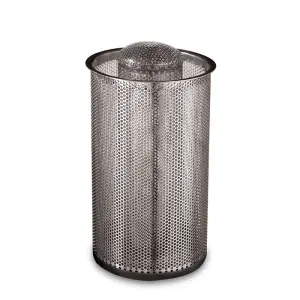What is Depth Filtration?

Depth filtration is accomplished by flowing fluid through a mass filter media providing a tortuous path with many entrapments to stop the contaminates. Fluid flow can be across, or inside to outside through the center. Certain types of solids do not lend to surface filtration so depth-type filtration is found to be more suitable.
Depth filters can be of cellulose, polyester, or polypropylene fibers which remove a broad range of particles, such as dirt, grit, sand, solids, gels, and rust particles. These types of filter elements retain different-sized particles throughout the entirety of the medium and hold 2-3 times as much contaminant as surface filters.
Depth filters are typically made up of layered fibrous material such that the outermost layer is designed to catch bigger particles, and the inner, more tightly packed layer is positioned to catch finer particles. This type of filtration, known as mechanical retention, ensures that the media is able to hold a large volume of solids before it becomes clogged, maximizing the filter’s efficiency.
Surface Filtration vs Depth Filtration
In short, the main difference between these two filters is that surface filters retain particles only on the surface of the media, whereas depth filters retain particles throughout the media.
In surface filtration, the size of particles removed is very clearly defined by the size of the pores in the media. As particulate matter passes through, these filters can form a layer or, a “filter cake,” which functions to increase the filter’s efficiency by anywhere from 30-40%.
Unlike surface filters, depth filters often begin with a 99% efficiency rating and are not reliant on a “cake layer” to increase their holding capacity. These filters use a sieving mechanism to ensure both large and small particles are filtered out. Depth filters not only retain a greater volume of particles than surface filters but can also filter out a wider range of different-sized particles, making them better suited to complex filtration applications.
Different Types of Depth Filter Cartridges
String Wound Filter Cartridges
Rosedale continuous wound cartridges are designed with layers of cotton or polypropylene string spun around a single central core to form a depth filter with higher efficiency, lower pressure drop, and greater solids holding capacity compared to standard elements at competitive prices.
Graded Density Filter Bags
GD bags have 9 layers of material, each with 4.4 sq. ft. of surface area, allowing for 4x the dirt-holding capacity of standard filter bags. GD bags can retain a large number of contaminants without clogging and produce excellent results when used as a pre-filter for membrane filtration. Available in either all polyester or all polypropylene construction.
Maximize Filtration Efficiency with Depth Filter Cartridges from Rosedale
No matter your application, Rosedale Products is here to help. We have the industry knowledge and product availability to meet any industrial filtration requirement. Apart from our depth filtration elements, we also carry a range of high-flow filter cartridges and pleated media designed for complex applications. Request a quote today or contact us to discuss your filtration needs.






